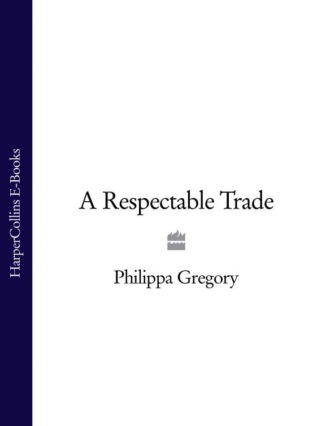
Полная версия
A Respectable Trade
‘It is I who am sorry,’ Mehuru said only once as they struggled to their feet. ‘I brought you far from your home and mine, I should have taken more care. I did not know that they had come this far inland.’
He did not finish his thought: that it was not only Siko whom he had failed. If the slavers were raiding this far inland then the whole of Africa was open to them and Mehuru could not send a warning. ‘The gods only know what will be the end of this,’ he said to himself. He was worried for the Yoruba kingdom and for its plan to boycott the slave trade. He did not yet know enough to fear for himself.
Siko wept like a little child, but Mehuru stayed calm. He knew that while they were within the borders of the Yoruba states his authority would be recognised. The men who had captured them were ignorant violent peasants of the worst sort. Mehuru tried to speak to them in all the African languages he knew but they answered him only with a threatening wave of a cudgel. He decided to wait until they reached their base camp. As soon as they reached their master, Mehuru would explain who he was and they would be released. In his more optimistic moments Mehuru thought what an excellent anecdote this would make back at the court, and what a hero he would seem: fighting slavery and personally endangered.
It took three days walking downriver to where the slavers’ boats were waiting, and at every halt the slavers went out and hunted down another man, another woman, another little child. Mehuru’s opposition to the slave trade had been theoretical; but when he saw the women sick with fear and the children too terrified to weep he knew that he hated the Trade and would be against it all his life. Then he longed to be back at court – not only to boast of his escape, but to add his voice to the counsels against slavery. He had heard it named as a sin but when he saw the whipping and the casual brutality, he understood for the first time in a comfortable leisured life what a mortal sin could mean.
And he was afraid – if the slavers had penetrated this far to the north and east then how far might they yet go? Africa was a massive continent, rich with people living well on fertile soil. Slavers using the river routes could penetrate deep and deeper into the very heart of nations. Mehuru had been in the borderlands of the Yoruba kingdom but even so, he was thousands of miles from the coast. How far would the slavers go for their Trade? What would it take to stop them?
They were twenty in all by the time they were loaded into the boats to travel downriver. They were made to kneel on the floor of rough wooden canoes, still bound neck to neck. The sun burned down on their heads, and where the lashes of the whip had cut the flies crawled and feasted. With hands lashed tightly behind him Mehuru felt the skin of his back cringe at the touch of the insects, the little minute trampling of their feet against his eyelids, the probe of their tongues into the gash on his face. The men paddled the canoes out into midstream and caught the smooth fast current, but the flies were not blown away. They followed like a haze, tempted by the smell of fearful sweat and open wounds.
The heavily laden canoe slipped past green thickly wooded banks like a dream, rocking only slightly as the men held it in the centre of the river. Sometimes the water was so wide that you could hardly see from side to side, sometimes it narrowed and Mehuru looked longingly at the banks. The sun beat down on them, the boat rocked them like a cradle. The heat haze danced on the banks and the flies buzzed around their heads. Mehuru thought of the silent progress of his ship, his nightmare ship, and its wake of sharks and the stink which hung around it in his dream.
On the fifth day they rounded a bend in the river and saw before them a large stone building, which could only have been built by white men with their strange desire for block shapes and their disregard for the contours of the land. It was nothing more than a cube, with little slits for windows, the roof steeply thatched. Before it, sticking out into the river, was a wooden jetty which led to a stone quay. Behind it was a cluster of huts, a poor slovenly place with no women to keep it tidy and no men to farm the land.
Mehuru thought that here at least he would find someone who would see sense and release them. He was anxious for Siko, who had stopped weeping and was now like a man drugged. The boy sat in the boat in silence, his eyes downcast on the green water, and neither the pain of the neck-brace nor the discomfort of sitting in the heat of the midday sun prompted him to speak. His eyes had gone blank with fear, he would not eat. Mehuru wanted them both to be released promptly, before the boy fell sick. He readied himself to demand to see whoever was in charge.
But there was no-one on the landing stage. There was a big iron gate in the massive stone wall and their boat was simply unloaded with shouted commands and whipped in through the gate. The men ignored Mehuru’s demand to see their master and pushed him into the entrance vestibule with the rest. When the outer gate clanged shut behind them, another was opened before them and they stumbled into a massive stone chamber ten times as big as the largest barn. A group of men pushed them into line and chained them, quickly and efficiently, with the chain running through their manacles, and fastened each end to rings set into the stonework of the wall. Mehuru noted the clumsy cast-iron manacles and chains, nothing like the light well-crafted metal of his own people. But it was good enough to hold him, to hold them all.
Time passed. He tried to count the dawns with marks on the dirt in the floor but there was no space, they were packed too close, and every day another couple, another dozen of new captives were added. The food was scanty and often bad. Many people were sick, vomiting into the slop pail, or voiding uncontrollably on to the earth floor. The smell was dreadful. There was no water for washing and no change of clothes. Mehuru banked down the flickering panic at his own degradation. He refused to let the dirt and the humiliation touch him, and he spoke encouragingly to Siko.
‘This is a mistake,’ Mehuru said. ‘They should not have taken us. When someone in authority comes I will tell them who I am. A Yoruban envoy cannot be so treated. When they realise who I am they will let us go.’
Siko did not reply. He would not look at Mehuru.
When new men and women were brought in Mehuru tried to speak to the jailers. Every time one of them came within shouting distance he called out to him, first in Yoruban, then in Dahomean, then in Mandinka: ‘Tell your master that I am an obalawa of Yoruba, on the king’s business. Tell him the king will pay a high ransom for me. Tell him I demand to speak with him!’
They did not understand, or they would not listen. Mehuru knew he must be patient and wait until he could speak to their leader. Then he would be released and he could demand that Siko be returned to him. His main fear was that they would try to keep Siko when they released him; and Mehuru’s duty to his slave, to offer complete protection in return for complete obedience, would be threatened.
He let himself worry about Siko, he let his concern for Siko be the principal, the only thing in his mind. While he could think of himself as a master, as a man of property with obligations, he could pretend that he did not belong in the nightmare storehouse, soiled with his own mess, with dirty hands and matted hair. He thought his sanity depended on him remembering that he did not belong there, that he was not a slave, he was a Yoruban envoy on a mission for the Alafin himself.
After about a month in which conditions in the storehouse grew worse and worse, there was a gathering, like some nightmare market. A new boat, a white man’s boat, had come upriver from the coast, bringing two white men. Mehuru readied himself to explain to the men that he must be released. All of the captives were dragged one at a time from their prison and brought out to a white man, who lolled on a chair under a tree.
It was Mehuru’s first sight of a white man, the race that was destroying his country. He had expected a towering demon or an impressive god – not this dirty weakling. His skin was pale, his clothes were grey and foul and the stink of him as he sweated in the sunshine was so bad that he could even be smelled above the stench from the storehouse. The man was wet all the time. He lounged on a chair in the shade but he did not sit still and consider his purchases. He shifted all the time in his seat, getting hotter and hotter and his terrifying pallor went an even more frightening flushed red colour and all his face grew shiny and wet with sweat.
When they pulled Mehuru forward by a twitch on the rope around his neck he was so shocked by the corpse face of the man, and the disgusting thick clumps of stubble hair on his chin and at the open neck of the dirty shirt, that for a moment he could barely speak. But then he drew himself up to his full height and looked the man in the eye.
‘I am an envoy of the Yoruban federation,’ he said clearly. ‘I must be released at once or there will be severe reprisals.’ He repeated the sentence first in Portuguese, the language of the slavers, and then in all the African languages he knew. ‘I demand the release of my personal servant and my own freedom,’ he said.
The white man turned his head to one side, coughed and spat a gob of infected yellow phlegm. He nodded to a second white man who stepped forward. Mehuru forced himself not to flinch; the man was rancid with the stink of drink and a sharp acrid smell of old sweat. Mehuru breathed in through his mouth and repeated the speech again in Portuguese.
The white man did not even reply. He put his filthy hands in Mehuru’s face and pulled back his lips to see his teeth. Mehuru jerked back, and staggered over the chains at his ankles.
‘How dare you!’ he cried. At once two of the African slavers seized him from behind and held him in an unrelenting grip.
‘Let me go!’ Mehuru shouted. He bit off his panic and spoke clearly in Portuguese. ‘You are making a serious mistake,’ he said urgently. ‘I am an envoy for the Yoruba federation.’
The white man nodded to the guard to hold him firmly, leaned down and pulled aside Mehuru’s loincloth. He pulled back the foreskin of his penis to see if he were infected, and then nodded at the guard to make him bend over, to see if the flux had left blood on his anus.
Mehuru’s outraged shout was stifled in his throat. When he felt the dirty hands on him he choked with shame. Siko was watching him, his eyes wide with horror. ‘It’s all right,’ Mehuru called in hollow reassurance. ‘We will get to their leaders and explain.’
It was bravado, not courage. That night when Siko had wept himself to sleep and was lying with his limbs twitching with dreams of freedom, Mehuru sat quietly, dry-eyed and horrified. The fingerprints of the white men burned on his skin, the recollection of their washed-out stares scorched his memory. They had looked at him with their pale eyes as if he were nothing, as if he were a piece of meat, a piece of Trade. They looked at him as if he were a nobody, and Mehuru thought that in their horrible transparent eyes he had seen the death of his individuality. He thought that if he lost his sense of who he was, of his culture, of his religion, of his magic power, then he would be a slave indeed.
Only the god, Snake, was with him in that long desolate night. Mehuru called on him to save him from the men who were as white as ghosts, and the Snake god laughed quietly in his long throat and said, ‘All men are dead men, all men are ghosts.’ Mehuru did not sleep that night, though he was weary through to his very bones.
The next day the chosen hundred were herded into canoes and taken down the river. Mehuru no longer depended on his powerful status as a representative of the Alafin of Yoruba. He kept a sharp lookout instead for a chance to escape and run, run like a slave, for freedom.
But even that could not be done. Not on the river journey, not when they were unloaded on the beach at the coast. The slavers had done this too often. Mehuru saw that they were practised in the handling of many angry, frightened people. They never came within reach, they whipped them into line with long whips from a distance. Mehuru kept watching for a chance to order the whole line of them to run – run in a great line towards the market place of the town – and in the confusion find hammers to shear the chains, and spears to kill and then scatter. But there were too many too lame to run fast enough, and too many little children crying for their mothers, chained in the line.
He waited, pretending obedience and waiting for his chance. They were herded through the little village at the mouth of the river and down to the wide white-sand beach where boats, white men’s boats, were drawn up with the waves washing around their keels.
When he saw the ship, the great ship, bobbing at anchor beyond the white breakers, his heart sank. It was the ship of his dreams come for him at last. The hot humid wind which blew steadily on shore brought the smell of death as clearly as if he could already hear the widows crying. Mehuru stared at the water around the ship and saw the swift movement of a shark’s fin – just as he had seen it in his dream. He looked at the prow which he had dreamed slicing so easily through the water and knew that it would cut through miles of seas. Even the rope of his dream was stretched out tight, as the ship bobbed on her mooring. It was all as he had known it.
Mehuru embraced despair then. The ship had been coming for him for months, he had seen it set sail, he had seen it arrive off his own coast, and now here it was at last, waiting for him. He closed his eyes as a man will close his eyes in death and let them herd him, like a sacrificial goat, on board.
Конец ознакомительного фрагмента.
Текст предоставлен ООО «ЛитРес».
Прочитайте эту книгу целиком, купив полную легальную версию на ЛитРес.
Безопасно оплатить книгу можно банковской картой Visa, MasterCard, Maestro, со счета мобильного телефона, с платежного терминала, в салоне МТС или Связной, через PayPal, WebMoney, Яндекс.Деньги, QIWI Кошелек, бонусными картами или другим удобным Вам способом.








